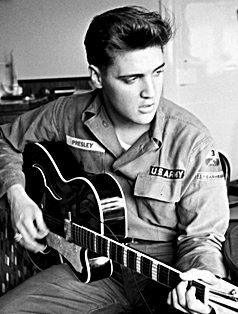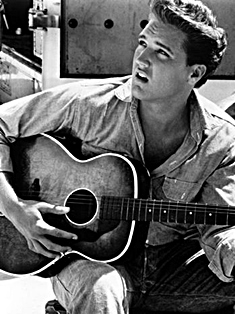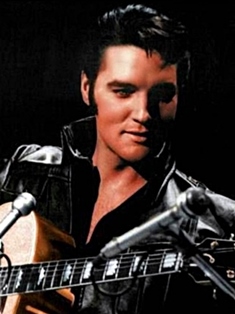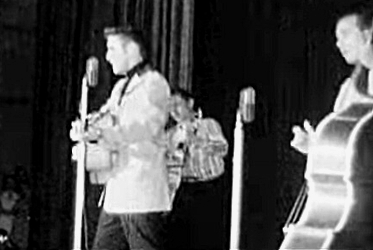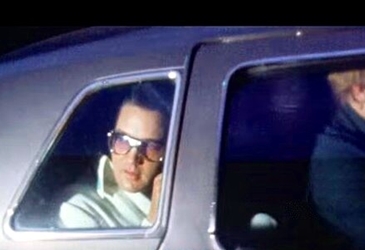'Elvis Presley: The Searcher'
2018 HBO Documentary & SONY release
The Publicity and the Reviews
Compiled by Piers Beagley
|
The HBO documentary ELVIS PRESLEY: THE SEARCHER debuts Saturday, APRIL 14 on HBO in the US.
The three-hour, two-film presentation focuses on Elvis Presley the musical artist, taking the audience on a comprehensive creative journey from his childhood through the final 1976 Jungle Room recording sessions. The films include stunning atmospheric shots taken inside Graceland, Elvis’ iconic home, and feature more than 20 new, primary source interviews with session players, producers, engineers, directors and other artists who knew him or who were profoundly influenced by him. The documentary also features never-before-seen photos and footage from private collections worldwide, and includes an original musical score composed by Pearl Jam lead guitarist Mike McCready.
EIN's Piers Beagley tracks the publicity and the reviews... |
 |
Updated May 1 - 'The Searcher' Worldwide possible release dates and more reviews |
HBO's 'Elvis-The Searcher': EIN contributor George Smith has posted some tremendous thoughts about 'Elvis-The Searcher' the new HBO documentary.
Whereas some fans have been disappointed with the lack of unreleased Elvis material on the soundtrack compilations George Smith points out the great positives..
- The very idea of this documentary is thrilling. I've been waiting all of my adult life for a serious and respected music film-maker to assemble the definitive Elvis documentary. Whether this turns out to be that documentary remains to be seen, but it looks very promising to me at the moment.
-It will make judicious use of existing tapes to tell the story of Elvis' journey as a creative artist. It will not contain substantial amounts of rare video and music, instead offering commentary from those who knew, loved, worked with and were profoundly influenced by Elvis Presley.
- The marketing imagery is brave and should be applauded. One of the reasons Elvis has relatively little respect among subsequent generations of music listeners is the often shoddy and cliched use of photographs and typography on his LP covers and advertising. The producers of this documentary have quite clearly and deliberately moved to the polar opposite with this project. There is not one single hint of the iconic Elvis used in the picture. Instead they have chosen a mug shot of an ordinary man. Clearly he is a handsome man, But he is just a man. Not a demi-God or a superstar, just a man. Similarly, they have used his full name and not just "ELVIS". Furthermore, the unorthodox use of a post-modern font moves us worlds away from the awful faux-classical centred style that has plagued his product for decades; witness the recent UK RPO releases (how to make a bad product worse).
- 'Elvis-The Searcher' may not necessarily be aimed directly at the keen Elvis collector. Instead, it will serve several purposes: it will draw in serious music fans who, until now, have not shown any interest in Presley's music or career but who respect the opinions of people like Springsteen, Petty, Landau, etc; |
 |
- It may possibly draw in the casual music fan who just likes to see a well-made documentary;
- It will hopefully draw very positive reviews from the press and the music press, and may even encourage an editorial or two about Elvis' much overlooked artistry and contribution to civil rights;
- It will at last give fans like me something to point the unenlightened towards when they confess to not liking or understanding Presley or his music (yes, there are lots of videos and excellent bits out there already, but nothing that does for Elvis what, say, "No Direction Home" does for Dylan).
- The accompanying CD will act as a simple tool to encourage those who "bite" to investigate further. It may not sell millions of copies and is not intended to but the graphics look gorgeous to my eyes, as does the track listing.
- This is potentially the single most exciting event in the Elvis world for the past decade, rivalling even the Tupelo box set.
|
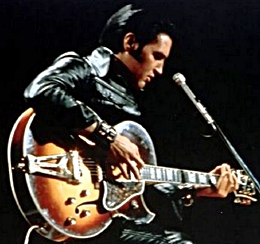 |
|
Deluxe |
VINYL |
..
|
<< UK Orders |
‘Bicycle Rider: Thoughts on The Searcher’: One of EIN’s most insightful contributors George Smith has written a stunning essay on the new HBO documentary ‘Elvis Presley: The Searcher’.
In his review ‘George Smith’ captures the essence of the narrative, Zimny’s production decisions and notes the difficulty of having to create a documentary about Elvis’ music and having to keep it under 4 hours.
His review includes,
“The genius of the documentary though, is in its decision to present Elvis Presley to all viewers in a new and unexpected fashion. For the devotees this is realised through the constant use of new film (professional and amateur) and studio outtakes: it keeps the faithful on their toes and creates the impression of seeing and hearing Elvis anew. This is why Zimny insisted on using the alternative Aloha, the handheld “Trilogy” and “Never Been to Spain”, the “Burning Love” rehearsal, the “If I Can Dream” outtake, the off-air segments from ’68, the non-masters of “Lonely Man”, “Hurt”, “Suspicious Minds”, “Loving You”.. It is a deliberate and clever approach which was much appreciated by this writer.”
Go here to “Bicycle Rider: Thoughts on The Searcher” this is essential reading. - DO NOT MISS THIS REVIEW
(Spotlight; Source;GeorgeSmith/ElvisInfoNet)
|
 |
'Elvis Presley: The Searcher' October DVD release: As we all hoped the HBO documentary 'Elvis Presley: The Searcher' will be getting a DVD release by SONY Pictures on 16th October 2018.
(How odd that it is not during Elvis Week).
The DVD is noted as being a "Collectors Edition" so hopefully it will contain lots of extras that fans have been waiting for.
"Elvis and Elvis's music pointed to black culture and said, 'This is filled with the force of life,'" noted Bruce Springsteen, "If you want to be an American, this is something you need to pay attention to."
The documentary seizes on moments, rehearsals, outtakes, when Presley's grit and fervor blasted away corniness and shtick. It shows him touching down in gospel music at his bleakest times and, near the end, strains to present him as a spiritual figure. Its finale is from that 1968 TV special: his wrenching performance of "If I Can Dream," longing for equality and redemption during a year of social turmoil. It shows Presley's passion and control, his visceral drama, his mastery.
The price and content have not yet been confirmed.
We will post more info as soon as we have it.
(News, Source;ElvisInfoNet)
|
 |
'Elvis: The Searcher' Part2 on Australian TV tonight: Music is the primary focus in 'Elvis Presley: The Searcher'. It follows the evolution of Elvis’s sound from mixing up gospel, blues and country in the '50s through to the movie musicals and Vegas crooning in the '60s. And while the question of whether Elvis was a cultural appropriator of black music or merely its champion/messenger may have been settled in the minds of many, the doco goes to great lengths to show us that neither are really true.
'Elvis: The Searcher' Part 2 is on Australian TV tonight on SBS TV.
Tom Petty noted, "Elvis was a light for all of us. We all owe him for going first into battle. He had no road map, and he forged a path of what to do and what not to do. We shouldn’t make the mistake of writing off a great artist by all the clatter that came later. We should dwell in what he did that was so beautiful and everlasting. Which was that great, great music.”
Of course, Elvis’s legacy isn’t just as a creator of great music. He’s “The King of Rock and Roll”. He single-handedly took popular culture into a new and exciting direction, leading John Lennon to famously say, “Before Elvis, there was nothing.”
|
 |
But there was actually quite a bit before Elvis.
And while the issue of whether he explicitly “stole” anything may not be as fiery a topic.. it’s an important part of how we appreciate Elvis’ significance.
In the early '50s, black performers like Little Richard, Joe Turner, Ike Turner, Ray Charles, Ruth Brown and Fats Domino were already making "R&B" / rock'n'roll, some white performers were too. 1951’s “Rocket 88” by Ike Turner (on 'Elvis The Searcher' Deluxe set) is now more widely considered the first rock and roll song than “That’s All Right”, which is a cover of an Arthur “Big Boy” Crudup song.
But in pre-Civil Rights America, when black artists were marginalised as creators of what was called “race music” and largely ignored by the white mainstream audience, who were more interested in balladeers like Tony Martin and Johnnie Ray. At least, they pretended to be. There’s evidence that white audiences listened to black music |
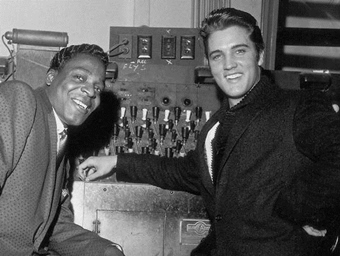 |
privately, even though it wasn’t socially acceptable to do so publicly.
Elvis helped change that.
And Elvis seemed to only have glowing praise for his contemporaries, giving credit where credit was due.
Elvis stated, "The coloured folks been singing it and playing it just like I'm doing now, man, for more years than I know. I got it from them. Down in Tupelo, Mississippi, I used to hear old Arthur Crudup bang his box the way I do now, and I said if I ever got to the place where I could feel all old Arthur felt, I'd be a music man like nobody ever saw."
Go HERE to EIN's important spotlight 'Elvis was NOT a Racist'
(News, Source;SBS/ElvisInfoNet) |
Elvis Presley: The Searcher (HBO film review): EIN's Nigel Patterson takes an in-depth look at Thom Zimny's documentary film about Elvis and his music.
What Nigel finds will surprise many fans. Discover what's The Good and The Bad about this new documentary looking at Elvis' music.
Is the film a masterpiece (the definitive Elvis documentary), over-rated or somewhere in the middle?
Read Nigel's review here
(Film Review, Source: ElvisInformationNetwork) |
|
'Elvis: The Searcher' on Australian SBS TV: Good news for all Australian Elvis fans as the free-to-air broadcaster SBS TV are showing 'Elvis Presley: The Searcher' documentary.
'Elvis: The Searcher' Part 1 on Sunday 27 May 8:30pm - 10:30pm
'Elvis: The Searcher' Part 2 on Sunday June 3 8:30pm - 10:30pm
In fact it is a good weekend for ELVIS on Australian TV as FOXTEL is also broadcasting a "Elvis TRIPLE movie special" plus a repeat of 'Elvis & Nixon'
FOX Classics is showing
- Kissin' Cousins Sun 27 May 12:00pm - 1:40pm
- Speedway Sun 27 May 1:40pm - 3:15pm
- King Creole Sun 27 May 3:15pm - 5:15pm
Masterpiece movie channel
- 'Elvis & Nixon' late at night Mon 28 May 12:15am - 1:40am
Thanks to EIN fan club member Peta Garriga
(News, Source;ElvisInfoNet)
|
 |
EIN review ‘Elvis: The Searcher’ Deluxe CD boxset: If your main interest in Elvis is his music then HBO’s ‘Elvis: The Searcher’ will probably become your favourite documentary ever produced about our hero.
The companion 3-CD deluxe edition box set offers an expanded 55-track overview of Elvis’ career as heard in the film including familiar hit recordings, powerful vocal performances and rare outtakes plus a bonus disc of additional recordings relevant to the film - including several early singles that inspired Elvis.
Thom Zimny said, "To live with the music of The Searcher over a period of years was more than a privilege. It changed my thinking about the emotional life of songs, both for those who make them and those who listen to them."
|
 |
'Elvis: The Searcher' Worldwide Dates: HBO / EPE are negotiating with various TV channels for a worldwide release of the new HBO documentary.
Priscilla has posted the following news...
For those who are inquiring where the documentary will be airing, below is a quick update on international launches of the show to date. Will share when I know more.
Canada/Bell Media - launch April 14
Flemish Belgium / VRT – launch May 10
Israel / DBS – TBC launch
S Africa / MNET – early May launch TBC
Latin America / HBO – summer launch TBC
UK – in active discussions
Australia and NZ – in active discussions
(News, Source;PP/ElvisInfoNet)
|
 |
'The Searcher' Separates the Trailblazer From His Tragedy: The New York Times has published a substantial and very positive review of the new HBO documentary.
It includes..
... There are no fried peanut butter and banana sandwiches. Nor is there a television with a bullet hole in its screen. Drugs, an unavoidable topic, are mentioned in sympathetic tones as an overworked performer's self-medication.
"Elvis Presley: The Searcher" strives to rescue the Elvis Presley story from its tabloid side. Instead, it presents a biography of an artist and musician who was both spectacularly gifted and unconscionably misdirected. Guided by his own ideas and instincts, he transformed 20th-century culture in the 1950s. But afterward, treated by his manager as a commercial workhorse, he spent years making trivial movies and performing as a nostalgia act.
The documentary presents Presley's relationship to African-American music as one of affinity and appreciation, not exploitation. "Elvis and Elvis's music pointed to black culture and said, 'This is filled with the force of life,'" Mr. Springsteen comments. "If you want to be an American, this is something you need to pay attention to." The excerpt chosen from "King Creole," the 1958 Presley film set in New Orleans, shows Presley listening to and then joining African-American street vendors' cries, acknowledging their influence.
"He did not invent rock 'n' roll per se," Tom Petty bluntly notes, citing Little Richard and Joe Turner. "What he did was different" a fusion of all Presley had absorbed. He was not a copyist. The film and boxed set include enough of Presley's sources to demonstrate how thoroughly he personalized songs like Arthur Crudup's "That's All Right" and Bill Monroe's "Blue Moon of Kentucky": the two sides, drawn from (black) blues and (white)
|
 |
bluegrass, of his first single for Sun Records. In retrospect, it was a perfect, archetypal mission statement of how he would defy categories.
(After the army) the rock revolutionary, under Parker's management, was supposed to fall into line as an entertainer. Sadly, he did.
There was no other career map at the time, and the Colonel did not encourage artistic exploration. Through the eventful mid-1960s Elvis was contractually bound to make movies with lame songs and diminishing returns. One of the documentary's most bitterly telling finds is an audio interview with a defeated-sounding Presley, where he says that while he'd like to make "artistic" films, "if what you're doing is doing O.K., you're better off sticking with it."
The documentary seizes on moments, rehearsals, outtakes, when Presley's grit and fervor blasted away corniness and shtick. It shows him touching down in gospel music at his bleakest times and, near the end, strains to present him as a spiritual figure. Its finale is from that 1968 TV special: his |
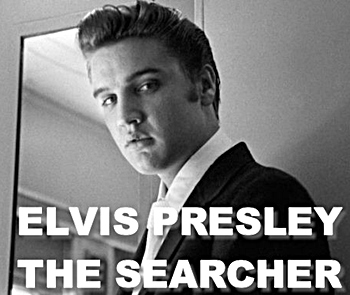 |
wrenching performance of "If I Can Dream," longing for equality and redemption during a year of social turmoil. It shows Presley's passion and control, his visceral drama, his mastery. But it can't explain all that he left undone.
Go here to the New York Times for the full review
(News, Source;ElvisInfoNet) |
‘Bicycle Rider: Thoughts on The Searcher’: One of EIN’s most insightful contributors George Smith has written a stunning essay on the new HBO documentary ‘Elvis Presley: The Searcher’.
In his review ‘George Smith’ captures the essence of the narrative, Zimny’s production decisions and notes the difficulty of having to create a documentary about Elvis’ music and having to keep it under 4 hours.
His review includes,
“The genius of the documentary though, is in its decision to present Elvis Presley to all viewers in a new and unexpected fashion. For the devotees this is realised through the constant use of new film (professional and amateur) and studio outtakes: it keeps the faithful on their toes and creates the impression of seeing and hearing Elvis anew. This is why Zimny insisted on using the alternative Aloha, the handheld “Trilogy” and “Never Been to Spain”, the “Burning Love” rehearsal, the “If I Can Dream” outtake, the off-air segments from ’68, the non-masters of “Lonely Man”, “Hurt”, “Suspicious Minds”, “Loving You”.. It is a deliberate and clever approach which was much appreciated by this writer.”
Go here to “Bicycle Rider: Thoughts on The Searcher” this is essential reading. - DO NOT MISS THIS REVIEW
(Spotlight; Source;GeorgeSmith/ElvisInfoNet)
|
 |
‘Elvis: The Searcher’ In UK Charts: There is no doubt that without the HBO documentary ‘Elvis Presley: The Searcher' being shown on TV there is little reason for fans outside the US to get excited about the new CD release. The tracklisting makes little sense unless you have seen the film - as Zimny has stated, "The soundtrack was in my mind from the beginning. The collection of recordings is for a person who saw the film, who wanted to complete the experience. To me, this collection is part of the film."
Unfortunately that lack of TV promotion has caused ‘Elvis: The Searcher’ to already drop out of the UK Top 100 Album Chart.
It appears on various other UK charts as follows:
- ‘Elvis: The Searcher’ Album Sales Chart – 74
- ‘Elvis: The Searcher’ Physical Album Chart – 56
- ‘Elvis: The Searcher’ Soundtrack Album Chart – 6
- ‘Elvis: The Searcher’ Scottish Album Chart – 88
In Australia, similarly with no TV promotion there has been dismal sales.
Last week in Australia it debuted on 16 April chart at #72 then dropped out of top 100 this week.
(News, Source;BrianQuinn/NP/ElvisInfoNet) |
 |
‘Elvis: The Searcher’ introduces a new generation to The King: Another look at the new HBO film from the Daily Dot - It includes..
.. There have been movies about Elvis Presley before, but there’s never been a definitive take on the “King of Rock 'n’ Roll.” Johnny Cash has 'Walk The Line', Ray Charles has 'Ray', but where’s the great Presley biopic?
'Elvis: The Searcher' is a more sensible way to cover Presley’s life and career than a traditional narrative film. Rather than picking over the many details of who he was and what he did for the thousandth time and trying to squeeze a single story out of it, it condenses everything, approaching Presley in a scholarly but streamlined way.
The Searcher comes on the heels of several other HBO docs about American cultural icons, including Arthur Miller: Writer, The Zen Diaries of Garry Shandling, and Andre the Giant.
And yet, unlike any of the other men HBO has profiled recently, Presley holds a certain cultural cache which only a few artists and entertainers from the last century ever achieved. If anything, he remains seen, if not heard.
|
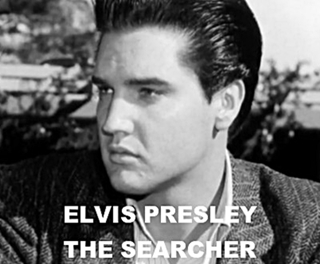 |
The popularity of his music may be up for debate, but his status as a staple of Americana remains unchecked. Ask any kid who Presley was, and even if they can’t name one of his songs, they can tell you what he looked like.
It’s the very reason we keep waiting for that great biopic about him, ELVIS is too big. No actor has ever adequately been able to fill the King’s blue suede shoes.
So, yeah, The Searcher had a lot to cover. The film pays special attention his 1968 TV special, using it as a framing device and suggesting that was the moment which forever cemented his legacy as a pioneering television performer. (Presley really did bring the house down with that show.)
Stylistically, The Searcher pieces this information together through a combination of archival footage and voiceover. |
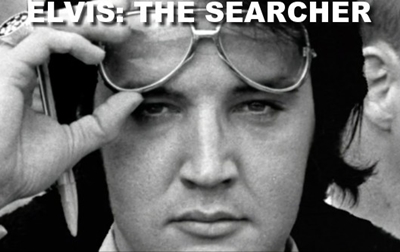 |
The sheer amount of audio Zimny collected, and how much time he spent collecting it, must be staggering, especially given the haunting snippets featuring the now-deceased Petty.
This artistic choice works for The Searcher.. the use of these disembodied voices does help give the impression that Zimny’s subjects are talking right to you.
Despite all the various perspectives we get on Presley here, all the countless hours Zimny obviously spent collecting stories, I still didn’t come away feeling like I knew much about the man. There’s a line in Ezra Edelman’s fantastic O.J. Simpson documentary, 'O.J.: Made in America', where one of the interview subjects says, “The story isn’t O.J., the story is O.J. and us.” This same principle can be applied to The Searcher. The documentary isn’t so much about Presley, but about the people in his life - how they related and felt toward him.
The film does provide some interesting details.
It explores Presley’s close relationship with his mother, for instance, as well as his exploitative partnership with Colonel Parker. I also had no idea how seriously Presley took acting, how he wanted to be seen as a James Deen or Marlon Brando, to be perceived as more than just a teen heartthrob. I didn’t know that he picked up his pill habit not in the music business, but in the military, where he would take drugs to stay up all night on watch.
What 'The Searcher' covers exhaustingly is Presley’s music. If you’re someone who appreciates discussions of craft, about how the twang of a guitar, the slap of a bass, or the beat of a drum can change a whole culture, then there’s a lot here you’ll love.
However, the film dances around the question of cultural appropriation.... the way Elvis pulled together elements of “Black music” like R&B and “white music” like country to write rock that could cross color lines is indisputable. But there’s something unexplored in The Searcher about how he exploited the music he worshipped.
There’s not a lot of recontextualization going on in The Searcher. The film is full of facts, but none of them are showcased in a new light. - Luckily the music speaks for itself.
Go here to 'the Daily Dot' for the full review -
(News, Source;DailyDot/ElvisInfoNet) |
'Elvis Presley: The Searcher' in UK Charts: Elvis Presley has had more than 50 Top 10 albums, most recently last November, when 'Christmas With Elvis & The RPO' reached No.6. He returns to the chart this week with his 94th Top 40 album, The Searcher, the soundtrack album to the new HBO documentary which aired in America at the weekend.
The new album 'Elvis Presley: The Searcher' has 2,507 units sold through UK Chart recognised retail stores and enters the Official UK Top 100 Album Chart at #32.
It has also entered other UK charts.
Physical Albums Chart Top 100 = NEW Entry #16
Albums Sales Chart Top 100 = NEW Entry #18
Soundtrack Albums Chart Top 50 = NEW Entry # 2
Vinyl Albums Chart Top 40 = NEW Entry # 15
Record Store Albums Chart = NEW Entry # 34
Scottish Albums Chart Top 100 = NEW Entry #12
- 'Elvis Presley: The Searcher' has also charted in the US Billboard charts
- Billboard Top 200 Albums charts at #145
- Billboard Top 200 Album Sales at #45 (3,889 albums sold)
(News, Source;BrianQuinn/ElvisInfoNet) |
 |
'ELVIS: The Searcher' a big HIT with fans: Finally Elvis fans with access to HBO in the US got to see the heavily-promoted new documentary over the weekend. The reviews were unanimously positive bar one or two fans who wanted more and a few others who asked why Billy Smith had not been included.
Ending with Tom Petty singing 'Wooden Heart' also didn't please everyone.
The Media in general also gave it a big thumbs up.
Superfan Keith Alverson who recently released one of the very best photo-books of Elvis in the seventies (Strictly Elvis 73-75) has posted the following review.
.. After watching it twice (first time with Marsha and some friends) and then with just my brother on the early morning replay, on a scale from 1-10 I would have to give it an 8!
I thought the music selection and audio quality was excellent! With over 3 1/2 hours of uninterrupted footage and commentary from various artists and key players in Elvis' life I feel that many very important points in his life was omitted. |
 |
For what reasons I do not know... there was plenty of time to cover it all in my opinion. Everything I am referring to could have been touched on in about 10 minutes!
There was too much B/W footage on the roots of his musical influence that could have been used for earlier coverage of actual Elvis instead I believe!
First I feel that after watching the film now ... if I didn't know any better ... Elvis was only involved with one woman in his life! There should have been some mention of Dixie Locke, June Juanico, Anita Wood, and then Linda Thompson that lived with him for over 4 years and Ginger Alden the last 10 months!
Other important events in Elvis' life should have been included also.....
- Elvis was credited with 3 Grammy awards in the 60s .... not mentioned!
- Elvis was acknowledged as one of the Jaycees 10 most outstanding young men in America for 1970 ... not mentioned!
- Elvis went to the White House and met with President Nixon in 1970 ... not mentioned!
- Elvis' only child Lisa Marie ... her birth was not emphasized as it should have been I think. You know his only daughter's birth was or should have been the greatest day of his life! There were a couple of photos/home movies of Lisa but not enough time was given I felt.
- In 1976 Elvis purchased his own personal airplane (The Lisa Marie) justly named after his beloved daughter. This was a very happy event in his last 2 years ... not mentioned!
- The 1969 Las Vegas engagement ... opening night was portrayed with footage from the 1970 summer engagement instead. Fans that are not as keen as others were led to believe they were seeing his first appearance in Vegas instead of footage a year later! |
 |
- There was no mention of key figures in Elvis' personal life in the film. Billy Smith (Elvis' cousin and closest companion) was completely omitted from the film as well as George Klein (another key member of his life since high school)!
- The TCB band's James Burton who did not miss one single concert, well you would think this man would be given some credit in the musical portion of Elvis' life but there was no mention and not even one individual photo of James Burton included in the film!
In comparison I was very impressed with the narrators chosen for the film. Tom Petty and Bruce Springsteen were excellent and honest with their remarks on Elvis' music! Red West was justly included as he was a key player in the early portion of his life! I just wish Tom Petty and Red West could have seen the final version of this documentary.
Of course I still wonder why Elvis' recordings and concert appearances after the 1973 "Aloha from Hawaii" worldwide broadcast are mostly never acknowledged! There was a few minutes in this film that included some home movies of concert footage that I was happy to see.
Honestly, I did enjoy this documentary but still feel it could have been better with a little more effort in recognizing these key events and major characters in Elvis' personal and musical life that I have mentioned.
I think every Elvis fan should watch this documentary and enjoy the music as I did! This film seems to dwell on the dark side of Elvis' latter life but in reality Elvis had a great life and was much happier than these experts portray!
I feel that as long as Priscilla and Jerry Schilling are constantly involved in every project... this is all we can expect in the future!
EIN thanks Keith Alverson for his insightful comments.
(News, Source;KA/ElvisInfoNet) |
'Elvis: The Searcher' "A beautiful way to rediscover the man": The Washington Post writes, 'Elvis Presley: The Searcher' is a beautiful way to rediscover the man who became King. Here is Elvis, rehabbed at last and brought down from his lofty and lunatic afterlife as an icon, reminding us that he was once just a man.
Of course, he was never just any man, he was ELVIS - from birth, it seems. The surviving twin of a doting mother, raised up from the Depression dirt of Tupelo and postwar slums of Memphis, opening his mouth in front of Sam Phillips' microphone and seamlessly merging black and white American song traditions into a form that was new and everlasting. He was imbued with the holy spirit of gospel music and landed instead on something faddishly called rock 'n' roll.
With a raft of producers that includes Priscilla Presley, director Thom Zimny's insightful and stirring documentary is a fine demonstration of how the passage of time can help place even the biggest and most over-loved superstars into a blessed relief. The film is a calm and deeply empathetic recounting of Presley's life.
A careful melange of archival film and sonic clarity, "The Searcher" is a fine reassessment of Presley's origins and impact. Its many sources, whether alive or dead (from Elvis himself to Col Parker to writers such as Alan Light and Jon Landau and musicians such as Robbie Robertson and Emmylou Harris) are heard in interviews rather than seen by a camera, which helps maintain a serious focus.
The only place "The Searcher" feels noticeably incomplete is when |
 |
the end arrives, perhaps out of deference to Priscilla's involvement or perhaps as a trade-off for access to a trove of archival material. Elvis' death at age 42 in 1977 is seen more as a release from misery than a preventable excess, and there's not one peep about his amazing and profitable afterlife as a dead icon.
The documentary also seems determined to settle old scores with Colonel Parker, who died in 1997 and whose management of Presley's career is portrayed here as cruelly constrictive and creatively tragic, choosing for his client a path strewn with cornball movies and, in the final years, Las Vegas servitude. A suggestive theory sort of hangs there: Even the King was beholden to the man, but still he rises.
The Washington Post
(News, Source;WP/ElvisInfoNet) |
 |
'Elvis: The Searcher' - damn near redeeming!: The excellent RogerEbert website also gives "The Searcher" a great review giving it 4 / 5 stars.
The review includes...
...Elvis Presley's image is so omnipresent in the culture it's like a Coca-Cola logo on a billboard in Times Square. Only a few figures have achieved such gigantic posthumous fame. Marilyn Monroe, James Dean, and Judy Garland are all on this pretty short list. The image of the performer is almost completely detached from the details of what the career was actually about. This process occurred while Elvis Presley was still alive, since he became so famous so fast.
"It all happened so fast. I'm afraid to wake up, afraid it's all been a dream." - Elvis Presley, 1956
In the press conference he gave before his Madison |
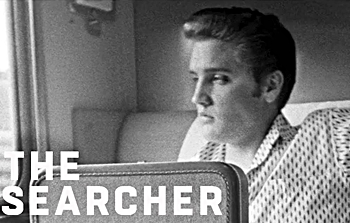 |
Square Garden concerts in 1972, he was asked if he was satisfied with his public image. Elvis, in a sky-blue suit with a jangling shiny belt, sideburns bristling down his face, replied, "The image is one thing. The human being is another. It's very hard to live up to an image." The image of Elvis shifts, depending on the entry point. What is so refreshing - damn near redeeming - about HBO's two-part documentary "Elvis Presley: The Searcher," is that the entry point is Presley's art.
... Zimny goes back again and again to the Comeback Special, at times letting the performance run in total. The group narration from Steve Binder, from Priscilla Presley, from Jerry Schilling has set us up powerfully. "That special is imprinted on my memory forever," says Springsteen.
That's what you see in the comeback special. A man with his soul at stake. |
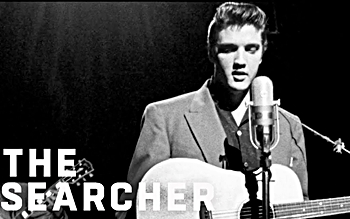 |
Zimny does a magnificent job leading us through the maze of events in the 1960s to this defining and galvanizing moment, a moment still electrifying today.
.. Musician and writer Warren Zanes observes in "The Searcher," "How do we know when we're listening to a song that someone means it? The people who mean it are generally the ones who are processing some kind of loss through music—and we can hear them negotiating their loss, and we connect to it." This is another way of saying Elvis was a man - from the very beginning - whose "soul was at stake."
Dave Marsh, also interviewed for "The Searcher," closes his great 1982 book on Elvis with this ringing paragraph: "Elvis Presley was an explorer of vast new landscapes of dream and illusion. He was a man who refused to be told that the best of his dreams would not come true, who refused to be defined by anyone else's conceptions. This is the goal of democracy, the journey on which every prospective American hero sets out. That Elvis made so much of the journey on his own is reason enough to remember him with the honor and love we reserve for the bravest among us. Such men are the only maps we can trust."
"The Searcher" shows why these words are not hyperbole.
Go here for full RogerEbert review
(News, Source;RE/ElvisInfoNet) |
'ELVIS PRESLEY: THE SEARCHER' OUT NOW:
The soundtrack to Elvis Presley: The Searcher showcases Elvis' most enduring hits, powerful performances and rare alternate takes, from his early blues and country-influenced recordings to his final 1976 recording sessions in the Jungle Room. The soundtrack is OUT NOW as an 18-track overview on CD or 2LP & a 3CD deluxe version which adds 37 additional Elvis cuts, original score compositions by Mike McCready of Pearl Jam plus songs that inspired Elvis, from R&B and country classics to his mother Gladys Presley singing at home. |
 |
| 'Elvis Presley: The Searcher' Deluxe 3CD Release: The 3-CD deluxe edition box set offers an expanded 55-track overview of Elvis’ career as heard in the film including familiar hit recordings, powerful vocal performances |
| (“That’s All Right,” “Tomorrow Is a Long Time,” “Trouble/Guitar Man”) and rare outtakes (“Suspicious Minds,” “Separate Ways”), plus a bonus disc of additional recordings relevant to the film - including singles that inspired Presley (Arthur “Big Boy” Crudup’s original version of “That’s All Right,” Odetta’s gospel version of Bob Dylan’s “Tomorrow is a Long Time”) and also features two original instrumental pieces composed for the documentary by Pearl Jam guitarist Mike McCready. - |
 |
3CD Deluxe set priced at around $35 - see updated prices below.
Elvis Presley: The Searcher (Original Soundtrack) Deluxe includes a 40-page book of photos, liner notes by Warren Zanes, and a producer's note from film director Thom Zimny. |
|
Deluxe |
VINYL |
..
|
<< UK Orders |
'Elvis: The Searcher' Pulls Back the Veil on the King: Rolling Stone published another great article on the new HBO documentary.
The main points noted were..
- The Elvis Presley stories repeated most often these days are rarely flattering. Some emphasize his lethal appetite for fatty foods and prescription painkillers; others dwell on bizarre anecdotes like his meeting with Richard Nixon, where he warned the president that the Beatles had an "anti-American spirit." The overall picture in these tales depicts a sweaty, bloated country bumpkin in a sequined jumpsuit who is quick to fire a gun at his own television set. It's a pathetic, cartoon distortion of the man that has little relation to the musical genius from Tupelo, Mississippi, who played a crucial role in the development of rock & roll in the 1950s and continued to innovate within the art form for the remainder of his career.
- The HBO documentary aims to finally restore the King to his proper place in the rock pantheon as a creative pioneer on par with Chuck Berry, the Beatles, the Rolling Stones and Bob Dylan. |
 |
Directed by Thom Zimny and produced by Jon Landau and Priscilla Presley, it tells Elvis' life story through his music, utilizing a treasure trove of unseen video, photographs and new interviews with his friends, collaborators and fans, including Bruce Springsteen and, in one of his final interviews, Tom Petty. Zimny notes, "I wanted to attack and shatter the shorthand version of Elvis Presley's life story - that after the Army there was just bad films, bad recordings, bad tours and then his life was over. This was a man driven by music, even at his darkest times."
Pivotally Zimny was given access to the Presley estate's complete audio and visual archive. "He had carte blanche to go into it," says Priscilla. "I wanted him to get whatever he needed to make this documentary truthful." The director also sent his research team to scour the planet for previously unseen items and ultimately had more than 6,000 still images to draw from along with Super-8 footage, 16-millimeter outtakes from newsreels and the complete studio sessions from his entire recording career. "One of the key recordings we found was Elvis' mom singing gospel songs, which had never been released. The landscape of this film is really built upon unseen archival footage that was buried deep in the vault" says Zimny
Rather than recycling the dueling narratives that dominate discussions of his legacy - that he either single-handedly invented rock & roll or merely copied rock pioneers and took all the credit because he was a photogenic white man - The Searcher explores "the complexities of an artist like Elvis". Much time is devoted to Presley's artistic journey and the rich musical terrain he was exposed to as a teenager. "I was aware of the storyline that Elvis took music from other people," Zimny adds. "And it just didn't make sense after having conversations with Priscilla and, most importantly, Dave Porter, who spoke with me of their time on From Elvis in Memphis and explained to me at length how the music of Beale Street influenced Elvis when he was growing up." |
 |
- The 1968 comeback special led to a brief period of renewed cultural significance and amazing live shows, but the limitations of Parker's managerial abilities hobbled Presley's career throughout much of the 1970s.
Jon Landau notes, "The second part of his career involved triumph over a lot of adversity. He didn't have a George Martin or someone to push him creatively. Most importantly, the material wasn't what it should have been. When you get the soundtrack to Clambake, there's only so much you can do. Still, Elvis brought his personality to everything that he did. The worst songs he ever recorded, the ones he was the most disinterested in, the signature of his singing was right there."
- The story of Presley's life is fleshed out by the voices of the people who knew him best and some of his most high-profile fans. Among many other interviews, Zimny spoke to guitarist Scotty Moore just a few weeks before he passed away in 2016. Lifelong Elvis fan Tom Petty sat down with the director for an hour at his home studio shortly before he launched what became his final tour. "Isolation brings on drug abuse," Petty says, in comments that now seem unsettling in the wake of his death. "It had to be very lonely, we know that. There's a point when you have success and you get really wealthy, and there's the day the letter comes that says none of this will make you happy. He knew he had to find something, but I think he gave up. I think he felt outgunned and gave up."
- To showcase Presley's latter years, Zimny zooms in on lesser-known tracks like "Hurt," a gut-wrenching song he recorded in Graceland's Jungle Room about a year before he died. "He was at the end of his life when he sang that song. It depicts his passionate love of music and acknowledges not just his sad loss in the world, but also the power and beauty of his singing voice."
Click here to Rolling Stone for the full article
(News, Source;RS/ElvisInfoNet) |
'The Searcher' Deluxe box-set first look: Netherland's 'It's Elvis Time' has been lucky enough to get hold of a promo copy of the 3-CD 'Elvis Presley: The Searcher' Deluxe set.
While there is nothing by Elvis that we haven't heard before he notes that the booklet is very nicely done and that some tracks sound remastered and better than before.
In particular a treat is the Elvis On Tour 'Burning Love' and 'Separate Ways' rehearsals that have been newly mixed by Matt Ross-Spang who did the 'Prince From Another Planet' release.
Tom Petty's comments are featured in the book thoughtfully noting,"You know, God bless him. He was a light for all of us. We all owe him for going first into battle. He had no road map and he forged a path of what to do and what not to do. And we shouldn't make the mistake of writing off a great artist because of all the clatter that came later. We should dwell in what he did that was so beautiful and everlasting, which was that great, great music."
EIN THANKS Rogier van Luyken from 'It's Elvis Time' for the great images and info. |
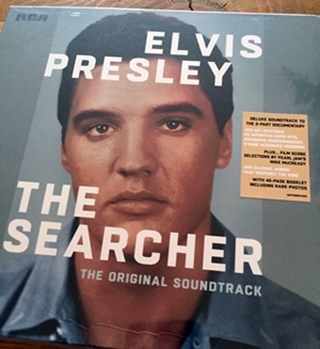 |
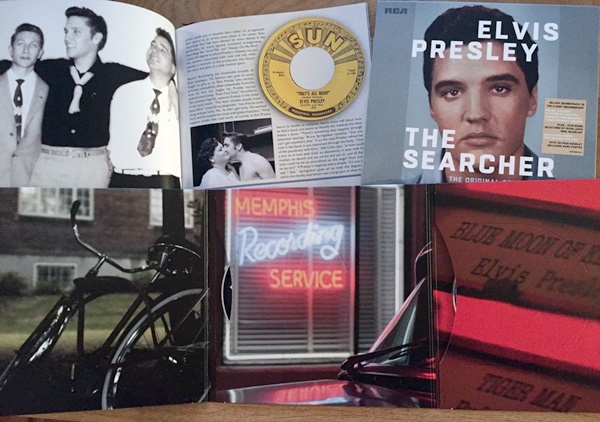 |
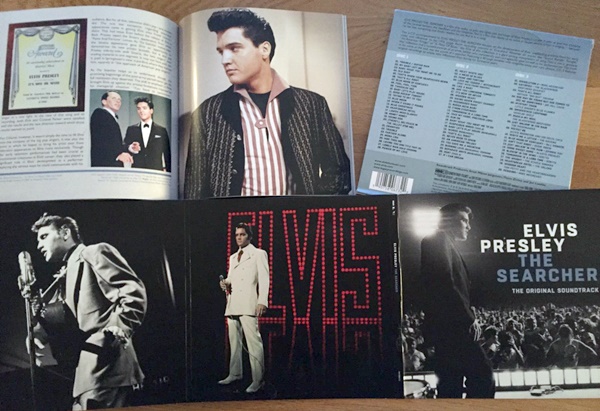 |
(Note that Elvis Matters have apparently used these unique images without permission!)
(News, Source;RVL/ElvisInfoNet)
|
Priscilla discusses ‘Elvis: The Searcher’: Recently Priscilla sat down with TV Channel-Guide to discuss their new project. Highlights of the discussion were..
Priscilla, "My favorite thing about The Searcher is that its backbone is what an ardent student of the human condition Elvis was — human movement, expression, emotion. Tell me about that choice.
People got sidetracked on, let’s say, his jumpsuits, or his movies. They weren’t the best movies and he knew that. But they never really got the depths of him as an artist. That his choice of music, even from a very young age, was way beyond his years. He mixed black and white music, he mixed country and rhythm and blues and even crooning because of his love of music. How about the first song he sang in public "Old Shep?” At that age, who sings “Old Shep,” which is a heart-wrenching story? Elvis. Because that’s how deep he was into music, feelings.
.. Gospel was Elvis' connection to hope, to faith, to someone. Sometimes I think, “What, who did he have to confide in, to really expose himself?” It was gospel music. From the very beginning, he would go to church with his |
 |
parents, and it was freedom for him because of the movement. The “holy rollers” would black out, not from just listening to music, but from spirituality. He had that too... he could not believe that he was being criticized because he moved.
At 14, the music that Elvis played on his record player when I would visit, was music that I never heard of. Country, Rhythm and blues, Gospel. He taught me so much in that time period about music and where his roots were and what he gravitated to and the feelings that he had for songs.
A lot of those songs that he played were connected to things that he felt. Being in the Army. Not having a mother. Being over there alone in Germany on maneuvers. He’d never been out of the United States, I got to see a different side of him.
|
 |
Regarding the Colonel, we all truly feel that Colonel Parker did love Elvis. It’s just Colonel was, first and foremost, a promoter. He did get Elvis to heights he never would have reached. There were times Elvis would be very embarrassed about him, when he’d get all dressed up in his get-ups. But he was promoting. Elvis was also very loyal, and it was hard to make that break, because he did get him where he wanted to go. Bottom line, Elvis just outgrew Colonel Parker.
Q. A truly gut-punch part of The Searcher is how the musical renaissance that Elvis helped launch passed him by while he was doing one fluff movie after the next.
Priscilla, "He was still doing movies when the Beatles, the British invasion, exploded and he would say he just didn’t know what to do because suddenly he’s the only solo singer. He’s going, “Where do I go? What do I do from here? Do I just give it all up and go to movies and just be an actor?” What the ’68 special did was it gave him confidence that, “I still have it, so now I’m going to start touring and I’m going to go to Vegas.” To do what he loved to do, which is perform in front of an audience.
Elvis truly did have a magnetism like none other... when Elvis walked into a room, it was electrifying. You can feel it before he walks in. I saw him perform in the ’68 special, but that was that was staged. He was really good, but I’d seen him do that at home, jamming. When I saw him in Vegas that first night, I was blown away. It was like slow motion, watching at the end as everybody is standing up. All his peers. Cary Grant, Sophia Loren, Raquel Welch, all standing. Dean Martin, Sammy Davis, all standing up and I’m watching, going, “Oh my God.” And here I was married to him!"
'Elvis Presley: The Searcher' premieres April 14 at 8/7c on HBO
Click here to ChannelGuide website for the full interview
(News, Source;ElvisInfoNet) |
The Hollywood-Reporter Praises The Searcher: In a recent article the Hollywood Reporter gave a marvelous write up on the new HBO documentary.
The review included...
Can it really be true that an Elvis Presley documentary as probing and thoughtful as Thom Zimny's 'Elvis Presley: The Searcher' doesn't already exist? After decades of home video performance-film releases and docs of varying quality, this two-part, three and a half-hour film feels like a landmark, something that should be welcomed as warmly as the two Elvis books published in the 1990s by Peter Guralnick. Chipping away calcified layers of myth and caricature to address the psychology behind Presley's career, its seriousness and sensitivity is no surprise to those who've followed the series of documentaries Zimny has been making about Bruce Springsteen. Sure to fare well when it debuts April 14 on HBO, it made for a spellbinding big-screen experience at the music-rooted SXSW Film Festival.
Zimny's most obvious big decision here is to keep every one of his interviewees offscreen, using only their voices to accompany vintage photos and clips. He's not the first documentarian to do this, of course, but few filmmakers with access to Springsteen, Tom Petty and Priscilla Presley would dare to hide their faces from fans.
The choice works for many reasons. It lets Zimny include the occasional clip from a pre-existing interview (including, sparingly, those with Presley himself) as if all were speaking directly to us; it establishes a trancelike tone; and it lets him jam in the kind of local-color footage he otherwise would have had to ditch in favor of talking heads.
|
 |
So now, when we're hearing from Elvis' childhood friend Red West or historian Bill Ferris, we're seeing the world this "most eclectic" music-lover was eagerly consuming: clips of everyone from Howlin' Wolf to sanctified preachers to bluegrass pickers; street scenes from Tupelo, Mississippi, and then Memphis, where the family moved, a place whose vibrant city life made it as exciting as Paris to small-town newcomers. The town was not integrated, but it was diverse, and the Elvis we meet was busy slipping into black nightclubs and houses of worship, picking his influences, magpie-like, as he assembled "his version of himself."
It's a thrill to join the musician in these years, even if only through the accounts of others, and Zimny follows as the young singer has his fateful encounters with Sun Studio's Sam Phillips. Petty tells us that, "for a lot of noble reasons," Phillips had been looking for a white ambassador who could carry the exciting sounds of new black music beyond the "race records" commercial ghetto created by the big record companies. He got more than he could have hoped for in Presley's sound, which, far from just aping Big Joe Turner et al, mixed strains of music few could have imagined would |
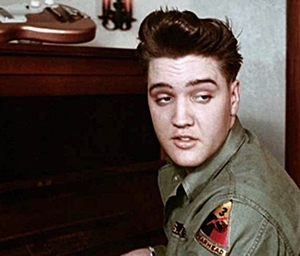 |
make sense together. Zimny and his interviewees offer plenty of colorful stories from this period, charting a commercial success that happened quickly but only, as Presley archivist Ernst Jorgensen points out, thanks to an enormous amount of work on the touring circuit.
And then came the Colonel. Zimny and company explain the appeal of Elvis' manager-to-be Colonel Tom Parker: The singer had sincere ambitions to act in movies, he wanted to sell records nationally and Phillips ran a one-man, regional operation that could not give him those things. As Part One moves toward a close, we see the Colonel giving his client everything he wants. On his first movies, Presley was so serious about acting he learned not just his lines, but everyone else's. He didn't even want to sing in them, but producers had different ideas. As did Uncle Sam, who drafted the star and put his career on hold.
Part Two is, of course, a darker experience, but the picture is more complicated than even a fairly serious Elvis fan may understand. Priscilla Presley, who made some appearances in the first part, offers much more here, helping us understand how being forced into making a string of lousy movies was one kind of artistic prison, and then being ensconced in casino hotels for his famous Las Vegas residency was another.
In one of very few expressionist moments, Zimny presents an array of cardboard Elvis cutouts in a hazy room, racking focus from one to another: The man who had so carefully created his original persona was now stuck in the shallow roles others forced him to play.
As difficult as things got for him personally, the film presents Elvis as a man who continued to be driven by the need to create meaningful music. Springsteen and Petty reject cynicism even when it comes to the spangled-jumpsuit years. The latter admires the "audacious craziness" of the size of the band he put together; in tackling material others might call pompous, like the Mickey Newbury medley "An American Trilogy," Springsteen admires Elvis for "trying to be a vessel that could contain the entirety of the American experience."
Elvis also wanted to take that experience to the rest of the world. Having never left the U.S. except with the Army, he wanted to tour Europe and Japan, but the Colonel had reasons to quash such ambitions. Throughout the two-part doc, Zimny has returned to footage from the 1968 "Comeback Special," presenting us with an example of how superstardom could be compatible with authentic artistry. Now, at the end, this motif becomes deeply emotional, connecting Elvis' ideals about racial harmony to the political world around him to the heartbreaks to come. It's enough to make those of us who always preferred Presley's Sun Studio peer Johnny Cash to shed a tear.
Go here to HollywoodReporter for the full review. EIN thanks Yvosus for the link
(News, Source;Yvosus/ElvisInfoNet) |
“Elvis: The Searcher” Don’t miss it.: The online Memphis Flyer recently published a neat article by Michael Donahue referencing the presence in one documentary sequence of his fellow journalist, Fred Chisenhall author of the famous headline“A Lonely Life Ends on Elvis Presley Boulevard” published by the Memphis Press-Scimitar at the time of Elvis death.
He writes... I remember getting chewed out big time by the late Fred Chisenhall, assistant managing editor/news at the old Memphis Press-Scimitar. An intern at the time, I misspelled several names of people involved in an art show. I took the names over the phone and I didn’t check any of the spellings. Consequently, the misspelled names got in the paper.
Chisenhall made an impression on me that afternoon. I was much more careful about checking spellings after that. “Chis,” as he was called, was a great newsman. I remember him, later, praising a story I did on an opera “super” - someone who takes bit parts in operas. The story landed on the front page. Chisenhall probably had something to do with that.
I was a copy boy on my last day of vacation the day Elvis died. I returned to work the next day to a much more manic than usual newsroom. |
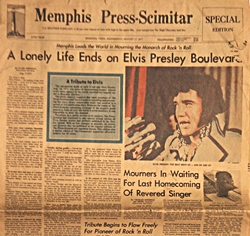 |
I recently found out that during all the craziness at the paper on Aug. 16 - phone calls coming in from all over the world and reporters scurrying to get the story - Chisenhall wrote the famous front-page Press-Scimitar headline, “A Lonely Life Ends on Elvis Presley Boulevard.”
Well, after seeing “Elvis Presley: The Searcher,” the three hour HBO documentary on Elvis’s life produced by Priscilla Presley and Jerry Schilling, that headline really made a new impression on me. I loved this documentary, which is such a wonderful, sad Southern story. At the end of his life, Elvis retreated into Graceland. The haunting shot of the columns that grace the porch Graceland will stick in my memory like scenes from a Tennessee Williams or William Faulkner work.
In one scene in “Elvis Presley: The Searcher,” Elvis is at the airport with a bunch of reporters around him. One of the reporters looks like Clark Gable. I couldn’t place the face. Then it hit me. It was Fred Chisenhall. And he was talking to Elvis like they were old friends!
We saw you, Chis.
The first part of “Elvis Presley: The Searcher” will premiere at 7 p.m. April 14 on HBO. Don’t miss it.
EIN thanks Yvosus (from FECC) for the link
(News, Source;Yvosus/ElvisInfoNet) |
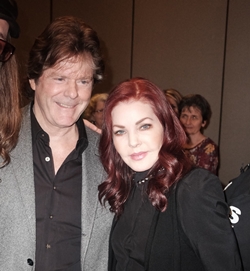 |
HBO The Searcher – Radio Special: Sirius Elvis radio featured a recent one hour special about the new HBO Elvis The Searcher documentary.
Director Thom Zimny, Priscilla, Jerry Schilling, David Porter (STAX) and HBO Producer Kary Antholis were all part of the discussion
While Priscilla tends to dominate the discussion a little too much and makes incorrect statements such as “the documentary goes from Elvis’ start in 1956” there are other interesting points raised.
Jerry Schilling notes that the work started “over seven years ago” and that they “shopped it around” to various companies before getting to HBO who rightly chose Thom Zimny as the director.
Zimny makes the most interesting points including why he chose the style he did and discussion about early Beale Street.
David Porter (of STAX) adds some soul and tells a great story of him and Isaac Hayes jamming with Willie Mitchell at a party for Elvis and Priscilla.
Jerry Schilling seems to defend Col Parker a little too much. (Where’s Marty Lacker for balance?)
Thom Zimny mentions how he discovered Elvis’ childhood bicycle rusting away at Graceland and how it became a metaphor within the documentary - and also notes how The Searcher is “As close as you can get to the story of Elvis in Elvis’ own words”
CLICK HERE to Soundcloud to listen. |
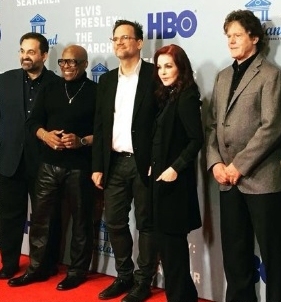 |
"The Baystar Dude" (from FECC) has kindly offered EIN readers the chance to listen to the one hour special.
Special EIN THANKS to "The Baystar Dude"
(News, Source/BSD/ElvisInfoNet) |
'Elvis: The Searcher' a fan review: One lucky fan, Jukebox (from PHOENIX The Elvis Forum) attended the Graceland premiere of the new HBO documentary.
His conclusion was "The Searcher - I've seen it and I liked it, but . . ." and his review's main points were ...
I'll simply start out by saying that I liked it, but I'm afraid it's not going to satisfy every Elvis fan to the fullest.
I personally give it 4 out of 5 stars... very good, but not excellent.
Positives:
1. All interviews or voice-overs were done without showing the faces of those speaking.
2. Commentary from Red West was scattered throughout the documentary, which means that Priscilla obviously thought enough of his firsthand accounts to include him in the documentary. There was nothing mentioned about the book Elvis-What Happened? ... a positive for sure.
3. I liked the way they went from the 1950s to the '68 Comeback Special with some effective splicing... especially with the song "That's All Right".
4. The '68 Comeback Special was sort of a centerpiece of the documentary.
5. Albums that were highlighted in a positive light were...
Elvis Presley; Peace In The Valley (EP); Elvis Is Back!; His Hand In Mine; How Great Thou Art; From Elvis In Memphis
6. Some color home movies of Sam Phillips at play from the 1950s were shown... at a beach and such.
7. Some of Elvis' 1950s voice-overs were new to my ears, which was a pleasant surprise!
Both versions of "Lonely Man" were used back-to-back in the movie. It started out with the master recording lasting about a minute + and then they smoothly transitioned with a splice to the solo version lasting about another 1 minute or so.
|
 |
They showed some unreleased footage from the Elvis On Tour mock sessions/rehearsals... "Burning Love" and "Separate Ways".
They used some unreleased close-up footage (from his chest up) in very good condition of Elvis performing "An American Trilogy" from 1973 (or '74) showing mostly the second half of the performance. The footage might have been from Las Vegas in August or early September 1973... |
Negatives:
1. The producer lead the unknowing viewer to believe that Graceland was the first house/home that Elvis bought. There was no mention of the Audubon Drive house in east Memphis. While the narrator was talking about Elvis' purchase of Graceland, they were actually showing several photos from the Audubon Drive home. Any knowing Elvis fan would quickly pick up on that.
2. It was stated in the movie that Elvis never played a concert outside of the United States. No mention of Canada 1957.
3. In the early section of Part 2, they made reference to Flaming Star and Wild In The Country as movies that "lost money". I don't think that's accurate. They may not have been the box office successes that G.I. Blues and Blue Hawaii were, but "money losers"? I don't think so.
They showed a quick image of a Flaming Star poster (bare chested Elvis holding a rifle) and had that screen-lettered as "Wild In The Country".
They then quickly showed an image of a Wild In the Country poster (image of Elvis about to kiss Hope Lange) as "Flaming Star".
4. They made the mistake of only saying that Colonel Parker wanted a Christmas song included in the 1968 NBC-TV Special. In truth, which they didn't hit on, was that Colonel Parker originally wanted the entire show to be a Christmas special. I was disappointed with their oversight on that crucial issue. It was during a segment focused on what a tough/unreasonable manager Parker could often be.
5. In Part 2 when making reference to the Aloha From Hawaii tv special, they only showed footage from the rehearsal show... "You Gave Me a Mountain" was highlighted, but the entire performance wasn't shown.
If my memory serves me correctly the only songs they played in their entirety without any interruptions from voice-overs were "Crawfish" in Part 1, and "Hurt" & "If I Can Dream" near the end of Part 2. I suppose the forthcoming 3-cd set is for complete songs.
One disappointment was that they only showed about 4 seconds of Elvis with Sam Phillips in Memphis from 1961.
|
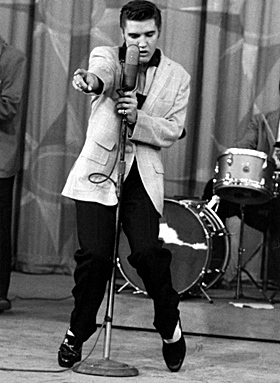 |
Of great significance...
The focus of the documentary by the producers was to attempt to give an honest overview and evaluation of Elvis' musical career.
They clearly wanted the viewers to know that Elvis' artistic decline in the mid-1960s was not due to lack of talent, but due to some awkward/poor decision-making by him and his manager Colonel Tom Parker.
One thing they made clear near the beginning of Part 2 (1960) was that Elvis was now in uncharted territory concerning what direction a rock-n-roller's career should take in order to keep him on top after being away in the military for almost 2 years.
They also wanted the viewers to know that his decline in the mid-1970s wasn't from lack of talent on his part.
Therefore, I feel that they did the right thing by letting it be known that Elvis' addiction to prescription medication played a major role in his personal outlook & unconventional decision-making during the last few years of his life.
Additional interesting points.
- They used commentary and voice-overs from Elvis throughout the whole documentary.
- Of the musician's there was interesting input from D.J. Fontana, Scotty Moore, Ronnie Tutt, Hal Blaine, Cissy Houston and others.
- It was a pleasant surprise to hear how much voice-over was used from Red West. (RIP)
- They only used about 15 - 20 seconds of Gladys' voice singing "Home Sweet Home"... and it was very chilling with a lot of echo. My gosh... It sounded like a ghost singing from beyond the grave!
I don't know if they added echo for the movie or if the recording really has that much echo. Either way, it was a joy to hear. I hope it lasts for more than 20 seconds on the soundtrack CD.
~ Jukebox (from PHOENIX The Elvis Forum)
EIN thanks "Jukebox" - from PHOENIX The Elvis Forum. - "The forum without silly ego-maniacs"
|
Priscilla and Emmylou Harris At Nashville: Priscilla and country-music legend Emmylou Harris posed together at the recent Nashville screening of 'Elvis Presley: The Searcher'.
Priscilla, now an amazing 72-years-old, wore a black vest over a creme button-up top with lace panels while Emmylou Harris, 70, wore a matching ensemble of a tan print coat with suitable country-style dark brown boots.
The veteran singer-songwriter earlier this year was a recipient of a Grammy Lifetime Achievement Award alongside luminaries such as Tina Turner and Neil Diamond.
Emmylou Harris provides commentary and adds her thoughts about Elvis to the new documentary. She also performed a duet with Chris Stapletonm at the January 28 ceremony from New York City, of Tom Petty's Wildflowers as an homage to the late rock legend, who died last October.
Priscilla earlier this week appeared on a panel at the debut of the documentary at SXSW in Austin, Texas, where she opened up about the depths of Elvis' addiction in his later years.
She said that she and others had tried to wean him off drugs, but his will was strong and influence was overpowering.
'People go, well why didn't anyone do anything? Well, that's not true,' Priscilla said, 'People there in the inner group did, but you did not tell Elvis Presley what to do. You did not. I mean, you'd be out of there faster than a scratched cat.
They would try and no way. He knew what he was doing."
(News, Source/SM/ElvisInfoNet) |
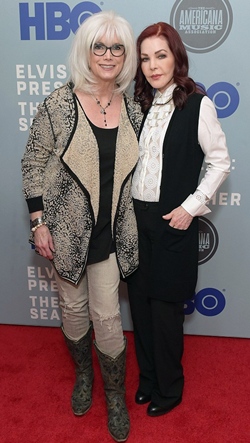 |
'Elvis Presley - The Searcher' first review: The HBO doco 'Elvis Presley - The Searcher' premiered at SXSW last week and they have now posted the first review from Jacob Knight...
'Elvis Presley - The Searcher' "An Exhaustive Portrait Of A Lonely Enigma" first review:
Thom Zimny's epic HBO documentary attempts to reconcile the King with his musical influences and massive cultural mark.
"The image is one thing. A human being is another."
We never see any of the interview subjects in Elvis Presley: The Searcher, despite most of them being pop music luminaries. The voices of Bruce Springsteen, Tom Petty, Stax Records' David Porter, Sun Records' Sam Phillips, Priscilla Presley, and even archival audio clippings from the King himself float over a continuous, free-flowing montage of footage - taken from home movies, concert recordings, media appearances, and feature films - like ghosts, commenting on a great God they're still attempting to make complete sense of.
We're transfixed by the image of Elvis, as the visuals proceed in chronological order. The legendary performer evolves from wild, churchgoing Mississippi youth, to uncontainable Memphis rockabilly stage presence, to GI Joe stationed in Germany, to kitschy cinema star, to black-clad '68 Special comeback kid, to a faded neo-opera singer - belly bloated with bad food, guilt and regret - his manager milking every last dime from the King's body before his heart gives out in August of '77. Elvis was our loneliest American enigma, a human being who transcended race and economics, only to get eaten alive by the "father" he trusted his career to. The King is dead, but we're still mesmerized by his otherworldly persona over forty years later, barely comprehending the human being who inhabited the icon.
|
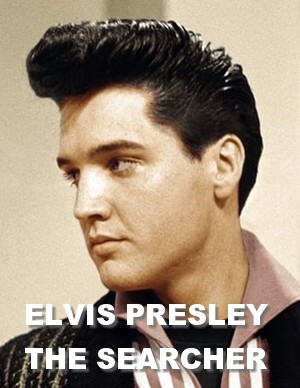 |
The Searcher doesn't seem to care about your own opinions on Elvis. Director Thom Zimney is completely unconcerned with whether you think he's one of the greatest rock-and-roll stars of all time, or perhaps one of the first true culture vultures: eating up black spirituals and then combining them with country and western tunes to create a whole new sonic beast. The movie's made up its mind regarding Elvis' place in history, anointing him perhaps the greatest American artist to ever grace the stage with his talents.
Part of this blatant hero worship has to do with Presley's estate giving the picture its full support (after all, Graceland's never going to have a hit piece's back). Instead, The Searcher is asking what it meant to be a hero to 50,000,000 Elvis fans. Based on Presley's own words - plus the examinations of those like Petty and Springsteen, who obviously looked to the King as a premiere influence - Zimney is examining what Gospel, Soul, R&B, Country/Western and even Pop Music meant to a Southern white man who grew up dirt poor, practically without a father, and possibly without a future beyond music. |
 |
Broken up into two parts - as The Searcher runs just shy of three-and-a-half hours - Zimny takes his time, trying to fill in as much background on Presley as he can before the artist recorded those early tracks with Sam Phillips in Memphis' Sun Records studios. He lets us soak in the boyhood melancholy of his father going to prison, and Elvis' subsequent undying devotion to his mother, Gladys Presley. There's those early shows, where Elvis was a "wild animal" on stage, his hips signaling their own sexual revolution as pearl-clutchers gasped in panic. TV hosts attempted to humiliate Elvis by turning Presley's persona into a novelty act to which they could condescend, many in the white establishment not wanting this underclass young man to bring "black music" to the masses. However, Elvis was such a force of nature that not even racist '50s regional broadcasts could subdue his swinging intensity.
Along comes Colonel Tom Parker, causing Presley to break from Sun Records, as the professional carnival barker promised national fame and "merchandising" to the future King. But this is where the understanding of Presley's choices becomes murky. Not even Priscilla Presley can offer up a cogent response as to why Elvis put so much trust into the man who would essentially work evil magic to undo his unruly youthful image. First, he insisted no special accommodations be made for Elvis when he was drafted and sent to Germany, opting instead to record a wealth of material that was released (and profited from) while the singer was overseas. After that, Parker continuously negotiated contracts with movie studios that transformed the rock legend into little more than a poppy OST maven, tarnishing his status as a disobedient sex symbol. |
Even when Elvis flexes and strains to come back following the completion of his service duty - his '68 TV Special viewed as a real "make or break" moment for the artist's career - the Colonel is always lurking in the background: a devil looking to take down this Patron Saint of Rock.
By the time Parker's pushing him through a grueling '70s touring process - hundreds of dates forcing the King to increase his intake of uppers and downers just to get by while his body puffed and swelled - The Searcher is clearly positing that Elvis was, in fact, not a human being to the person he arguably put the greatest amount of faith in. For Colonel Tom Parker, the musician was a cash machine: an image being utilized to make this enterprising monster rich. |
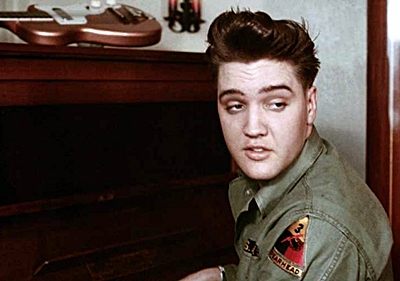 |
The Searcher tries to bring as wide a comprehensive lens to the King as possible, and for the most part succeeds in spades. It's only when Zimney attempts to contextualize his music - in a very similar fashion to the way Ezra Edelman did with OJ Simpson's rise and fall in Made In America - that the picture lacks ever so slightly. The Searcher touches on what a white man creating a new sound out of black culture during the beginnings/height of the Civil Rights Movement meant to America as a whole, but never dives deep enough to really deliver a substantial analysis. Perhaps an eight-hour cut - which this writer would gladly sit through - could offer an interrogation of that nature. Still, it's difficult to fault a documentary this ambitiously spellbinding, as we're invited into the soul of a legend, in the hopes of letting us feel and appreciate its fabric, while simultaneously seeing where the grueling taxations of fame caused it to split at the seams.
PLEASE go here for the full original review
(News, Source;SXSWFilm Review) |
"An Inside Look" at Elvis Presley: The Searcher: Priscilla spoke last Thursday at the SXSW premiere of the HBO documentary 'Elvis Presley: The Searcher'.
In this short YouTube video fans can get a first look with Director Thom Zimny and Executive Producer Priscilla Presley as they show a fresh perspective on one of the world's most famous musicians, ELVIS.
At SXSW Priscilla opened up about the rock star's drug addiction and his final days.
She said, "We certainly didn't see it coming. But we certainly saw the journey he was taking."
- CLICK HERE to YouTube to watch this great Behind The Scenes video |
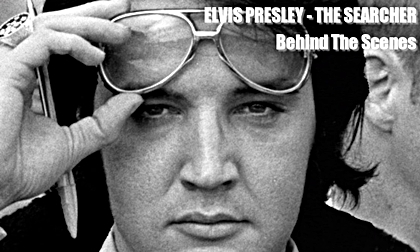 |
"People go, 'Well why didn't anyone do anything?', well, that's not true. People there in the inner group did, but you did not tell Elvis Presley what to do. You did not. I mean, you'd be out of there faster than a scratched cat. They would try and no way. He knew what he was doing."
Priscilla who met Elvis back in 1959 when he was serving in the U.S. Army, said that the singer started taking pills when he was stationed in Germany.
"That was the thing -- they gave them to the soldiers over there to keep them awake. He was on guard at that time. He had maneuvers that he had to do late at night, so the pills were given to the guys and that's how he started. And if you take a sleeping pill, you have to do something to get yourself awake. ... He was in unchartered territory, he truly was, and he did this and tried to do this alone."
During their marriage, which ended in 1973. she said she tried to hide his pills, but he always found them.
Elvis Presley took sleeping pills because he had insomnia and a fear of going to sleep, a phobia his ex-wife says dated back to childhood.
Directed by Thom Zimny, "Elvis Presley: The Searcher" premieres on HBO on April 14.
(News, Source,ElvisInfoNet) |
'Elvis Presley: The Searcher' Debuts at SXSW: The brand new HBO doco 'Elvis Presley: The Searcher' debuts this week at the US 'South by Southwest Film Festival' on March 14 & 15.
Elvis Presley: The Searcher offers a fresh look at one of the most famous musicians in history, with a dedicated focus on the man as a working musician, not just the caricature that time and fame has drawn. “This is really, I think, the definitive documentary about the artist, the man behind the music,” says Priscilla. Divided into two films, the three hours of archival footage, photo stills, and narration reveal a rare intimate glimpse of Elvis, almost like stepping inside of his private photo albums.
|
 |
“My heart goes out to him,” she said. “This film humanizes him so much. . He was a genius. ... His management just saw him as a moneymaker.” Priscilla was executive producer of the film,
Austin, a musical city where Priscilla has roots, is seemingly the perfect place to premiere a film about a working musician. According to director Thom Zimny, “Elvis got in the car with a bass on top and traveled on the road; he learned his craft playing one-night stands.” That thinking was why executive producer Glen Zipper convinced him to premiere the film at SXSW, “and I think he was right. It really is a reflection of a lot of the energy in the movie, and of the love for music, and for the South, in the film. ... When I was thinking about the Elvis story, that was the key: to keep discussing the music and not fall into some sort of examination of his lifestyle, to really to look at history differently. What were the influences on Elvis? Who were the people surrounding Elvis as a child that helped develop that sound?” |
 |
With “absolute carte blanche” access to the archives, including thousands of stills and over 6,000 digital recordings, Zimny digs deep into the personal musical history of Elvis. The second film even includes a previously undiscovered recording – “a really haunting vocal” – of Elvis’ mother Gladys singing. Zimny said, “I was chasing those lost details because it paints a much more complex, layered vision of Elvis than had been out there before. Priscilla gave me a side of him that I hadn’t seen in other books or films. I got to hear about his frustrations with his career, and also just his frustrations as a person who loved music, and the destructive force of making those films.”
“I think if there’s any tragedy in the two films it’s to realize that Elvis as an artist was held back,” added Zimny.
To anchor the films stylistically, Zimny decided not to include any visuals of the interviews, instead focusing exclusively on the archival footage and photos, with voiceover narration peppered throughout. “I came into filmmaking as an editor and worked on many documentaries. There have been moments where I just dealt with voice – and the rhythm of voice – and with the Elvis film it was really important that I lived in the space that Elvis occupied. ... I felt that the idea of seeing someone talk in a chair would ground you to a contemporary vision of the film taking place. I wanted the film to feel like a dream where you were going back into time seeing Elvis in Super-8 home movies, seeing the space of Graceland as a character, and hearing these voices – the voice of Elvis or the voices of people who spent time with him. I wanted the voices to have this musical feel, and I wanted to be able to play with images and ideas against the soundtrack.”
Elvis Presley: The Searcher explores far more than his greatest hits. Little-known recordings and performances, as well as Elvis’ gospel roots, are highlighted, and interviews with Tom Petty, Bruce Springsteen, and industry giants such as Jon Landau and David Porter shed light on his other critical influences.
A lifelong Memphian, Porter watched Elvis transform from just a kid hanging around the Beale Street clubs to a major talent who explored the influences of black artists while still maintaining his own style. The legendary songwriter and producer, formerly in charge of A & R at Stax Records said, “Elvis was amazing – not at trying to make anyone think he could dance like Jackie Wilson – but he had that animation and that movement that gave him an individual identity that was just as impactful as it was to watch Jackie Wilson dance at the Flamingo. It just speaks to the visionary parts of his creative mind.
“There are no new emotions, so when a person has the ability to find an impactful way to affect people’s emotions, based on how they are creatively able to do that, that’s a stroke of genius, a stroke of creativeness that’s hard to find,” added Porter. “I think true artists find things about themselves that amplify their credibility, and not every artist has the intellect to seek things in their inner core to do that. But when you find ones that are able to do that, they become the greats, like Michael Jackson, like James Brown, like Elvis Presley.”
Go HERE to AustinChronicle for the full article
(News, Source;austinchronicle/ElvisInfoNet) |
'Elvis Presley: The Searcher' Official Trailer: HBO have posted the official trailer for 'Elvis Presley: The Searcher'. Fans will love the fact that it DOES feature plenty of new home-footage that has never been officially released before. Includes some stunning footage from the 50s, 60s and 70s. This looks AWESOME - at last a documentary fit for a king.
With this film, filmmaker Thom Zimny (director of several documentaries for Bruce Springsteen) sought to showcase Elvis Presley in a way that few have seen: past the larger-than-life image of The King of Rock and Roll to reveal the man and the artist “who wanted to heal, to find that thing that was always felt to be missing, and to do it through the music.” Elvis Presley: The Searcher offers unprecedented access to Elvis, featuring new interviews with his collaborators, artists inspired by him (Bruce Springsteen, Tom Petty, Emmylou Harris) and never-before-seen photos and footage of Presley at work and at play. The result is an intimate look at a performer countless audiences around the world have heard but only few have truly known.
|
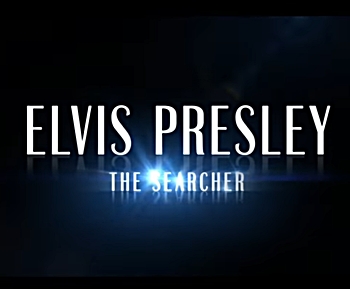 |
| Saturday 24 February 2018 |
'Elvis Presley: The Searcher': The LA Times also ran a promo story about the new Elvis HBO documentary and box-set.
The article includes....
HBO's "Elvis Presley: The Searcher" largely sidesteps the rock star's status as a pop culture icon in favor of highlighting his artistic ambitions, with a companion soundtrack album that similarly favors his most creative recordings over his signature hits.
'Elvis Presley: The Searcher - Original Soundtrack' spans his earliest recordings at Sun Studio in Memphis, such as 'That's All Right' and 'My Baby Left Me' through song choices that reveal his questing nature that often was obscured by his fame as well as by his detour into Hollywood and, later, Las Vegas.
Thom Zimny notes, "The soundtrack was in my mind from the beginning. I wasn't just |
 |
making a film, I was thinking about the collection of recordings I would gather for a person who saw the film, who wanted to complete the experience, just as I always had."
The deluxe edition also includes a disc containing recordings that influenced Presley, such as Arthur "Big Boy" Crudup's rendition of "That's All Right," the Blackwood Brothers gospel group's version of "Satisfied," bluegrass patriarch Bill Monroe's rendition of "Blue Moon of Kentucky" and Lloyd Price's hit version of "Lawdy Miss Clawdy" that Presley greatly admired.
The soundtrack album is produced by longtime Presley archivist Ernst Mikael Jorgensen, Zimny and rock writer-manager Jon Landau.
"In this collection, one gets not a greatest hits package but a song-by-song, curated portrait of an artist," musician-turned-author Warren Zanes writes in the book included with the deluxe edition, "an artist who very consistently and courageously gave himself to his performances, as if in the giving he might find some missing part of himself."
Among the numerous Presley disciples Zimny and Zanes interviewed for the documentary are Bruce Springsteen and Tom Petty, who, Zimny told The Times, recently shared his thoughts about the King of Rock 'n' Roll late in the process, but who provided insights Zimny found invaluable.
"He was a light for all of us," Petty said of Presley, whom he met in Florida when Petty was 10, on the set of a film Presley was shooting there - a meeting Petty has credited with helping put him on the path to be a musician himself.
"We all owe him for going first into battle," he said. "He had no road map and he forged a path of what to do and what not to do. And we shouldn't make the mistake of writing off a great artist because of all the clatter that came later. We should dwell in what he did that was so beautiful and everlasting, which was that great, great music."
- By RANDY LEWIS LA Times - (News, Source;LAT/ElvisInfoNet) |
'ELVIS PRESLEY: THE SEARCHER' OUT April 6: This spring, the three-hour, two-part documentary Elvis Presley: The Searcher will peel back the legend of The King of Rock and Roll to focus on Elvis' evolution as a musician and a man. The Thom Zimny directed feature uses rare footage and new interviews with those who knew Elvis best to share the stories behind the songs that made him famous.
The soundtrack to Elvis Presley: The Searcher showcases Elvis' most enduring hits, powerful performances and rare alternate takes, from his early blues and country-influenced recordings to his final 1976 recording sessions in the Jungle Room. |
 |
| The soundtrack will be available on April 6 as an 18-track overview on CD or 2LP & a 3CD deluxe version which adds 37 additional Elvis cuts, original score compositions by Mike McCready of Pearl Jam plus songs that inspired Elvis, from R&B and country classics to his mother Gladys Presley singing at home. |
'Elvis Presley: The Searcher' Deluxe 3CD Release: The new multi-part documentary Elvis Presley: The Searcher, directed by Thom Zimny and airing on HBO on April 14, pushes past the larger-than-life image of The King of Rock and Roll, portraying him instead as a man and an artist “who wanted to heal, to find that thing that was always felt to be missing, and to do it through the music.”
The 3-CD deluxe edition box set offers an expanded 55-track overview of Elvis’ career as heard in the film including familiar hit recordings (“Heartbreak Hotel,” “Are You Lonesome Tonight?”), powerful vocal performances (“That’s All Right,” “Tomorrow Is a Long Time,” “Trouble/Guitar Man”) and rare outtakes (“Suspicious Minds,” “Separate Ways”), plus a bonus disc of additional recordings relevant to the film - including singles that inspired Presley (Arthur “Big Boy” Crudup’s original version of “That’s All Right,” Odetta’s gospel version of Bob Dylan’s “Tomorrow is a Long Time”) and two original instrumental pieces composed for the documentary by Pearl Jam guitarist Mike McCready. - 3CD Deluxe set priced at $40
Elvis Presley: The Searcher (Original Soundtrack) Deluxe includes a 40-page book of photos, liner notes by Warren Zanes, and a producer's note from film director Thom Zimny. |
 |
Disc 1: 1 Trouble / Guitar Man, 2 My Baby Left Me, 3 Baby, What You Want Me To Do, 4 Old Shep, 5 That's When Your Heartaches Begin, 6 That's All Right, 7 Blue Moon Of Kentucky, 8 Fool, Fool, Fool, 9 Tweedlee Dee, 10 Baby Let's Play House, 11 Good Rockin' Tonight, 12 Trying To Get To You, 13 Blue Moon, 14 When It Rains It Pours, 15 Blue Christmas, 16 Heartbreak Hotel, 17 Lawdy, Miss Clawdy, 18 Money Honey, 19 Hound Dog, 20 (There'll Be) Peace In The Valley (For Me), 21 Crawfish, 22 Trouble, 23 Farther Along, 24 Mona Lisa, 25 Hide Thou Me, 26 Loving You (End Title Take 16), 27 Lonely Man (Solo Version), 28 Power Of My Love
Disc 2: 1 Milky White Way, 2 A Mess Of Blues, 3 Fame And Fortune, 4 Love Me Tender / Witchcraft (Duet With Frank Sinatra), 5 Like A Baby, 6 Are You Lonesome Tonight?, 7 It's Now Or Never, 8 Wooden Heart, 9 Swing Down Sweet Chariot, 10 Reconsider Baby, 11 Bossa Nova Baby, 12 C'mon Everybody, 13 Tomorrow Is A Long Time, 14 Take My Hand, Precious Lord, 15 Run On, 16 Baby What You Want Me To Do, 17 Suspicious Minds (Take 6), 18 Baby Let's Play House (Rehearsal), 19 Words (Rehearsal), 20 That's All Right, 21 Never Been To Spain, 22 An American Trilogy, 23 You Gave Me A Mountain, 24 Burning Love (Rehearsal Version), 25 Separate Ways (Rehearsal Version), 26 Hurt (Take 5), 27 If I Can Dream
Disc 3: 1 Mike Mccready - Dissolution 2, 2 The Blackwood Brothers - Satisfied, 3 Arthur "Big Boy" Crudup - That's All Right, 4 Joe Hill Louis - She May Be Yours But She Comes To See Me So, 5 Little Junior's Blue Flames - Mystery Train, 6 Howlin' Wolf - Smokestack Lightning, 7 The Blackwood Brothers - Rock-A-My Soul, 8 The Prisonaires - Just Walkin' In The Rain, 9 Jackie Brenston And His Delta Cats - Rocket 88, 10 The Ravens - Write Me A Letter, 11 Bill Monroe - Blue Moon Of Kentucky, 12 Eddie Snow - Ain't That Right, 13 Johnnie Ray - Just Walkin' In The Rain, 14 Lloyd Price - Lawdy Miss Clawdy, 15 Gladys Presley - Home Sweet Home, 16 Odetta - Blowin' In The Wind, 17 Odetta - Tomorrow Is A Long Time, 18 The Staple Singers - The Weight, 19 The Orlons - Heartbreak Hotel, 20 Tom Petty And The Heartbreakers - Wooden Heart, 21 Mike Mccready - Rebound
(News, Source;SONY/ElvisInfoNet) |
'Elvis Presley: The Searcher' Single CD Release: The new multi-part documentary Elvis Presley: The Searcher, directed by Thom Zimny and airing on HBO on April 14, pushes past the larger-than-life image of The King of Rock and Roll, portraying him instead as a man and an artist “who wanted to heal, to find that thing that was always felt to be missing, and to do it through the music.”
This soundtrack features 18 songs as heard in the film including familiar hit recordings (“Heartbreak Hotel,” “Are You Lonesome Tonight?”), powerful vocal performances (“That’s All Right,” “Tomorrow Is a Long Time,” “Trouble/Guitar Man”) and rare outtakes (“Suspicious Minds,” “Separate Ways”).
Elvis Presley: The Searcher (The Original Soundtrack) – Single CD / Digital - Priced at $12
1. Trouble / Guitar Man, 2. My Baby Left Me, 3. That’s All Right, 4. Baby Let’s Play House, 5. Heartbreak Hotel, 6. Lawdy, Miss Clawdy, 7. Hound Dog, 8. Crawfish, 9. Mona Lisa, 10. Milky White Way, 11. Like A Baby, 12. Are You Lonesome Tonight?, 13. It’s Now Or Never, 14. Tomorrow Is A Long Time, 15. Suspicious Minds (take 6), 16. Separate Ways (rehearsal version), 17. Hurt (take 5), 18. If I Can Dream.
(News, Source;SONY/ElvisInfoNet)
|
 |
'Elvis Presley: The Searcher' 2LP VINYL Release: The new multi-part documentary Elvis Presley: The Searcher, directed by Thom Zimny.
Also released as a DOUBLE-VINYL set this soundtrack features 18 songs as heard in the film including familiar hit recordings (“Heartbreak Hotel,” “Are You Lonesome Tonight?”), powerful vocal performances (“That’s All Right,” “Tomorrow Is a Long Time,” “Trouble/Guitar Man”) and rare outtakes (“Suspicious Minds,” “Separate Ways”).
Elvis Presley: The Searcher (The Original Soundtrack) – CD / Digital - Priced at $25
LP. Trouble / Guitar Man, 2. My Baby Left Me, 3. That’s All Right, 4. Baby Let’s Play House, 5. Heartbreak Hotel, Side 2 - 6. Lawdy, Miss Clawdy, 7. Hound Dog, 8. Crawfish, 9. Mona Lisa, 10. Milky White Way,
LP Two - 1. Like A Baby, 2. Are You Lonesome Tonight?, 3. It’s Now Or Never, 4. Tomorrow Is A Long Time, Side 2 - 5. Suspicious Minds (take 6), 6. Separate Ways (rehearsal version), 7. Hurt (take 5), 8. If I Can Dream
(News, Source;SONY/ElvisInfoNet) |
 |
Elvis 'The Searcher' Hits & Rarities Soundtrack: Rolling Stone has run a short news piece for the up-coming The Searcher release.
An expansive soundtrack Elvis Presley: The Searcher, will be released April 6th. The soundtrack features a mix of Elvis hits and alternate mixes, while a deluxe edition will feature selections from the documentary's score composed by Pearl Jam guitarist Mike McCready.
The Searcher soundtrack will be available digitally and on CD and double vinyl LP, while the deluxe edition will packaged as a three-CD set. All versions are available to pre-order.
Along with the original soundtrack and parts of Pearl Jam's Mike McCread's score, the deluxe edition of The Searcher soundtrack will include a plethora of bonus material including additional rarities, Tom Petty and the Heartbreakers' rendition of "Wooden Heart" and classic R&B, country and gospel songs that inspired Elvis.
The set will also come with a 40-page hardcover book packed with rare photographs and a note from director Thom Zimny.
Thom Zimny, "From day one I had a soundtrack in mind; one that would cover Elvis in a new way and go deep into the vault. Thanks to the help of Sony Legacy and the efforts of Ernst Jorgensen, I was able to pore over thousands of recordings and Elvis Presley outtakes. I also wanted the film's soundtrack to pay tribute to the many artists who influenced Elvis, and to incorporate their music to create a sonic landscape that I hoped would give the viewer the experiences Elvis had absorbing the many genres he was exposed to and influenced by – from gospel, to R&B, to country."
He added that McCready's score "brought additional sonic textures and emotional overtones that helped to capture this artist's journey."
The Searcher will premiere on HBO April 14th.
The film was made with the cooperation of EPE and Zimny was reportedly allowed unprecedented access to the Graceland archives.
(News, Source;RollingStone/ElvisInfoNet) |
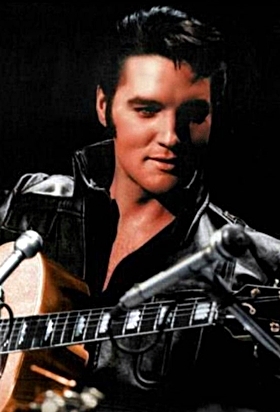 |
'Elvis Presley: The Searcher' Doco Debuts April 14: 'Elvis Presley: The Searcher' the comprehensive documentary exploring Elvis' creative journey is confirmed to debut on HBO on April 14 2018
RCA/Legacy will release a matching audio set on April 6
The HBO documentary ELVIS PRESLEY: THE SEARCHER debuts Saturday, APRIL 14 (8:00–11:00 p.m. ET/PT) on HBO.
This three-hour, two-film presentation focuses on Elvis Presley the musical artist, taking the audience on a comprehensive creative journey from his childhood through the final 1976 Jungle Room recording sessions. The films include stunning atmospheric shots taken inside Graceland, Elvis’ iconic home, and feature more than 20 new, primary source interviews with session players, producers, engineers, directors and other artists who knew him or who were profoundly influenced by him. The documentary also features never-before-seen photos and footage from private collections worldwide, and includes an original musical score composed by Pearl Jam lead guitarist Mike McCready.
As previously announced by SXSW, Priscilla Presley, David Porter (legendary Memphis music writer and producer), Thom Zimny (director), Jon Landau (producer) and moderator John Jackson (SVP A&R, Sony Music) will discuss the film, the cultural impact of Elvis’ music and how that impact became the embodiment of rock’n’roll at the 2018 SXSW Festival in March. The panel is expected to cover:
• how Elvis found inspiration in black and white gospel music of Tupelo
• his early experience with the great African-American blues and r’n’b of Memphis
• his evolution as an artist with Sam Phillips |
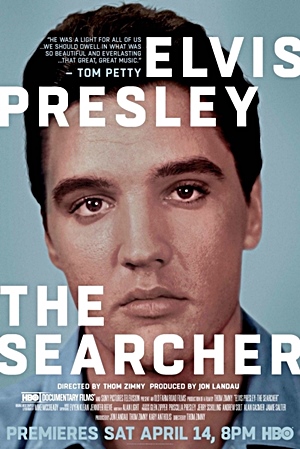 |
• the creative impact of his time serving in the U.S. Army in Germany
• the creative highs and lows of his career in the 1960s, culminating in the triumphant ’68 special
• an assessment of Elvis as a performing artist in the early ’70s, featuring a discussion of Jon Landau‘s seminal 1971 review of Elvis in concert
• a discussion of the interviews conducted for the film, including insights into the conversations with Scotty Moore, Red West, Bruce Springsteen and Tom Petty, among others
• insight into the creation of the film’s score by Pearl Jam’s Mike McCready
• an inquiry into the artistic and personal struggles that preceded his death in 1977
RCA/Legacy Recordings, a division of Sony Music Entertainment, will release “Elvis Presley: The Searcher”, the musical companion to the HBO/Sony Pictures documentary, on Friday, April 6. It will be available in digital and physical configurations.
ELVIS PRESLEY: THE SEARCHER is an HBO Documentary Films Presentation in association with Sony Pictures Television; executive producers, Glen Zipper, Priscilla Presley, Jerry Schilling, Andrew Solt, Alan Gasmer and Jamie Salter (chairman ABG); producers, Jon Landau and Kary Antholis; directed and produced by Thom Zimny.
(News, Source;ElvisInfoNet) |
'Priscilla Talks about new HBO doco: Priscilla recently talked with Billboard magazine to promote the new 2018 Elvis HBO documentary 'The Searcher'.
'Elvis Presley: The Searcher' presents an unprecedentedly deep look at his life and music, from his first forays into Memphis blues clubs to his early stardom, up through his late ’60s comeback and exhausting ’70s touring. The nearly three-and-a-half-hour-long, two-part documentary) features new interviews with scholars, stars like Bruce Springsteen and the late Tom Petty, and Priscilla Presley.
The main points Priscilla noted were..
... (Col Parker hangs over the film like an avenging angel) ... Elvis was so grateful Colonel Parker took him where he wanted to |
 |
go. The hardest thing was realizing that Parker was a great promoter but didn't know anything about music, or about his subject, Elvis Presley.
.. The film ends with Bobby Kennedy’s death and Elvis’ extraordinary rendition of “If I Can Dream” .. Elvis’ politics, he was for peace. He didn't understand this whole thing with Vietnam. But he didn't get involved in politics. It was the one thing you didn't do: an entertainer was to entertain.
.. Even though we were divorced, we remained very close. We had long conversations at night. He wanted to perform, to get out. He had nervous energy. In fact, he wanted to go all over the world. He wanted to explore.
Elvis Presley: The Searcher will also get a soundtrack released through Sony/Legacy
(News, Source;BB/ElvisInfoNet) |
August 2017 - "Elvis Presley: The Searcher" HBO Doco: HBO have announced the name of their forthcoming major Elvis documentary that will debut next year.
"Elvis Presley: The Searcher" is a three-hour, two-film presentation focusing on Elvis Presley the musical artist, taking the audience on a comprehensive creative journey from his childhood through the final 1976 Jungle Room recording sessions. The films include stunning atmospherics shot inside Graceland, Elvis’ iconic home, and feature more than 20 new, primary source interviews with session players, producers, engineers, directors and other artists who knew him or who were profoundly influenced by him.
The documentary also features never-before-seen photos and footage from private collections worldwide.
An HBO Documentary Films Presentation in association with Sony Pictures Television; executive producers, Glen Zipper, Priscilla Presley, Jerry Schilling, Andrew Solt, Alan Gasmer and Jamie Salter (chairman and CEO, Authentic Brands Group); producers, Jon Landau and Kary Antholis; directed and produced by Thom Zimny.
Thom Zimny, is a Emmy and Grammy winner who has work on multiple Bruce Springsteen projects
“The producers came to HBO and Sony with the idea for a film drawing upon very rare footage that captures Elvis’ musicianship in a new and exciting way. The artistry on display in that footage reminded us of the great work by Jon Landau and Thom Zimny on their previous HBO documentaries, we are thrilled to have them at the helm to lend their unique cinematic perspectives to this iconic, complex and singular artist” noted HBO's Kary Antholis.
Debuts in 2018.
(News, Source;HBO/ElvisInfoNet)
|
 |
Compiled by EIN / Piers Beagley.
-Copyright EIN February 2018 - DO NOT COPY IMAGES OR INFO WITHOUT PERMISSION.
EIN Website content © Copyright the Elvis Information Network.
Click here to comment on this article
| Elvis Presley The Searcher, Elvis Presley The Searcher, Elvis Presley The Searcher, Elvis Presley The Searcher, Elvis Presley The Searcher HBO documentary, HBO Elvis Presley The Searcher, Elvis Presley The Searcher HBO, Elvis Presley The Searcher, |
See EIN review of 'Prince From Another Planet'
See EIN review of 'A Boy From Tupelo'
See EIN review of 'Young Man With The Big Beat'.
See EIN review of 'Elvis Is Back!' Legacy Edition review:
See EIN review of 'The Complete Elvis Presley Masters' in-depth Review
See EIN review of 'On Stage' 40th Anniversary LEGACY in-depth review:
See EIN review of From Elvis In Memphis (40th Anniversary Legacy Edition)
See EIN review of 'I Believe' BMG Gospel set.
See EIN review of 'The Complete '68 Comeback Special' CD Review:
EIN Website content © Copyright the Elvis Information Network.
Elvis Presley, Elvis and Graceland are trademarks of Elvis Presley Enterprises.
The Elvis Information Network has been running since 1986 and is an EPE officially recognised Elvis fan club.
\
|
|











